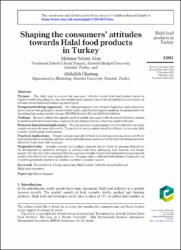| dc.contributor.author | Akın, Mahmut Selami | |
| dc.contributor.author | Okumuş, Abdullah | |
| dc.date.accessioned | 2022-03-16T08:47:20Z | |
| dc.date.available | 2022-03-16T08:47:20Z | |
| dc.date.issued | 2021 | en_US |
| dc.identifier.citation | Akın, M. S. ve Okumuş, A. (2021). Shaping the consumers' attitudes towards Halal food products in Turkey. Journal of Islamic Marketing, 12(6), 1081-1096. https://doi.org/10.1108/JIMA-08-2019-0167 | en_US |
| dc.identifier.issn | 1759-0833 | |
| dc.identifier.issn | 1759-0841 | |
| dc.identifier.uri | https://doi.org/10.1108/JIMA-08-2019-0167 | |
| dc.identifier.uri | https://hdl.handle.net/20.500.12511/9124 | |
| dc.description.abstract | Purpose
The study aims to examine the consumers' attitudes toward halal food products based on tripartite model. Regarding this, the effect of halal food awareness, perceived risk and behavioral tendency on attitudes toward halal food products are investigated.
Design/methodology/approach
343 valid questionnaires were obtained. Exploratory and confirmatory factor analyses were performed to ensure content validity, and structural equation modeling was progressed to test the relationships among variables through IBM SPSS Statistics 22.0 and AMOS 23.0 software.
Findings
Research validates the tripartite model of attitude and suggests attitude toward halal food is formed by predominantly behavioral tendency and partially psychological drivers, rather than cognitive elements.
Research limitations/implications
The characteristics of participants should be different and larger sample may provide some other results. The product or service context should be different, for example, halal cosmetic, halal hygienic, halal tourism.
Practical implications
Trigger messages may put forward in marketing communications activity for halal food products marketing and halal certificated food brands need to establish their distribution networks effectively to get closer with consumers.
Originality/value
Attitudes towards halal products represent the key driver of consumer behavior for the development of marketing strategies in certified halal firms addressing both domestic and foreign markets. It is the first study examining Turkish consumer attitudes toward halal food product using tripartite model in the field of halal consumption behavior. The paper offers a different methodological framework and it could be potentially of interest for scholars, marketers and policy makers. | en_US |
| dc.language.iso | eng | en_US |
| dc.publisher | Emerald Group Holdings Ltd. | en_US |
| dc.rights | info:eu-repo/semantics/embargoedAccess | en_US |
| dc.subject | Attitude Toward Halal Food | en_US |
| dc.subject | Halal Food Awareness | en_US |
| dc.subject | Halal Market | en_US |
| dc.subject | Islamic Marketing | en_US |
| dc.subject | Perceived Risk | en_US |
| dc.title | Shaping the consumers' attitudes towards Halal food products in Turkey | en_US |
| dc.type | article | en_US |
| dc.relation.ispartof | Journal of Islamic Marketing | en_US |
| dc.department | İstanbul Medipol Üniversitesi, Sosyal Bilimler Meslek Yüksekokulu, İşletme Yönetimi Ana Bilim Dalı | en_US |
| dc.department | İstanbul Medipol Üniversitesi, İşletme ve Yönetim Bilimleri Fakültesi, İşletme Bölümü | en_US |
| dc.authorid | 0000-0002-8175-4618 | en_US |
| dc.identifier.volume | 12 | en_US |
| dc.identifier.issue | 6 | en_US |
| dc.identifier.startpage | 1081 | en_US |
| dc.identifier.endpage | 1096 | en_US |
| dc.relation.publicationcategory | Makale - Uluslararası Hakemli Dergi - Kurum Öğretim Elemanı | en_US |
| dc.identifier.doi | 10.1108/JIMA-08-2019-0167 | en_US |
| dc.institutionauthor | Akın, Mahmut Selami | |
| dc.institutionauthor | Okumuş, Abdullah | |
| dc.identifier.wos | 000539546300001 | en_US |
| dc.identifier.scopus | 2-s2.0-85086027979 | en_US |
| dc.identifier.scopusquality | Q2 | en_US |


















